News, views, and information for APLS members.
Dear Members of the APLS Community,
As we approach the end of what has been another remarkable year (and not for the good reasons!), I am currently feeling a great sense of gratitude.
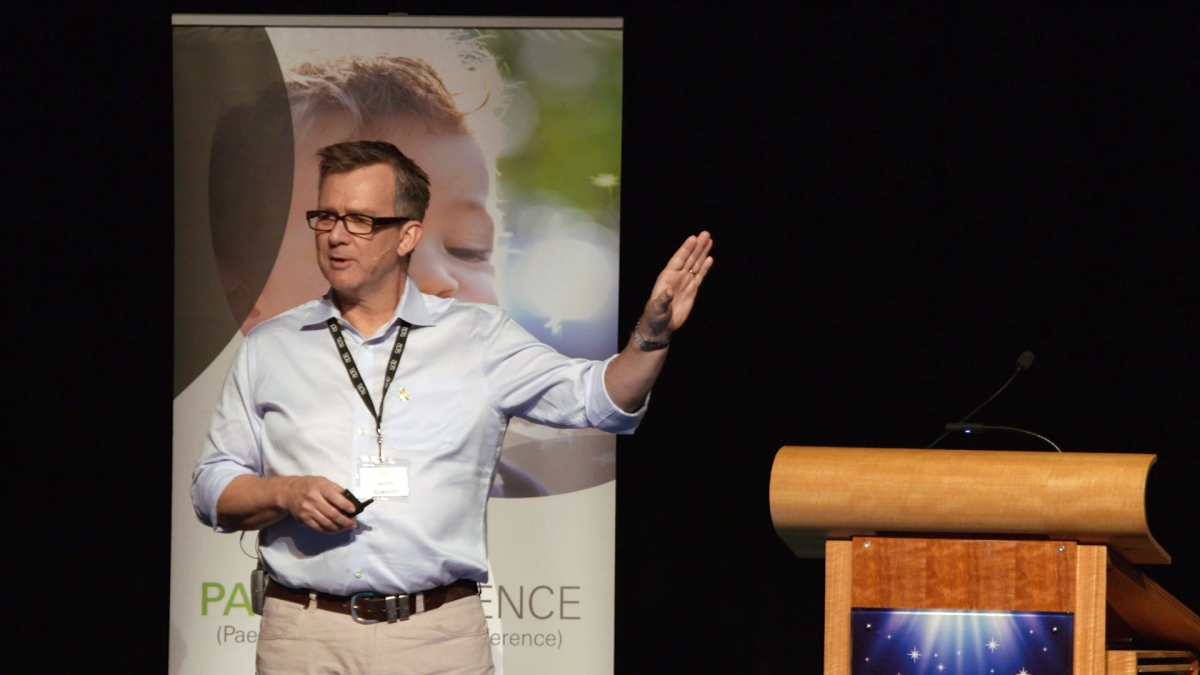
I am very thankful that we seem to have fared pretty well during the pandemic (compared to many other countries) and I look forward to the greater freedoms that will be coming to most of us over the next few weeks to months. I am also very grateful that the scientific community has been able to so rapidly develop & produce effective vaccines against COVID-19. I say this despite the mild ache I have in my arm after receiving my COVAX booster shot yesterday – I certainly feel a lot safer than I did 18 months ago!
APLS Australia will emerge from the pandemic intact but not unscathed. As a not-for-profit organisation, our margins are very small and the large number of courses that we have had to cancel this year has resulted in our previously strong financial position becoming more precarious. What will save us next year, is the strong ongoing demand for our courses – the recent release of our course calendar was hugely popular! And we plan to open up even more places on courses and even more courses as the travel situation becomes clearer.
The safety of our staff, our instructors, and our learners remains our greatest concern. We will continue to employ our current risk minimisation strategies and will be asking that all instructors and learners are fully vaccinated before coming onto our courses.
I have been very heartened also by the great response we have had from our instructors to our call for help. Our instructors remain our greatest resource and we have really appreciated the commitment and loyalty of so many instructors who have responded by taking on extra courses for 2022. Cancelling courses due to a shortage of faculty is very disappointing for candidates, chews through our remaining financial reserves, and is our option of last resort.
If you haven’t already done so, please log on to the APLS website and choose your courses for next year. We still advise that you choose mainly local courses in your own state, but we hope to be arranging more interstate travel in the second half of 2022.
Updates to the ANZCOR Paediatric Life Support guideline set (ANZCOR guidelines 12.1-12.5) have now been finalised.
I made a short video to summarise the changes in the guidelines. If you are interested, you can view the video here:
And the guidelines can be downloaded from the following links:
ANZCOR Guideline 12.1 - Paediatric Basic Life Support (PBLS) for health professionals - November 2021
ANZCOR Guideline 12.2 - Paediatric Advanced Life Support (PALS) - November 2021
ANZCOR Guideline 12.3 - Management of other (non-arrest) arrhythmias in infants and children - November 2021
ANZCOR Guideline 12.4 - Paediatric resuscitation in special circumstances - November 2021
ANZCOR Guideline 12.5 - Management after Return of Spontaneous Circulation (ROSC) - November 2021
These guidelines are based upon the evidence from the ILCOR Consensus on Science with Treatment Recommendations (CoSTR) statements, were created by the ANZCOR Paediatric Advanced Life Support Sub-committee and will be the basis of our APLS life support curriculum.
Thanks to all of those in the APLS Community who took the time to provide feedback on the drafts. The guidelines have now been endorsed by both Australian and New Zealand Resuscitation Councils and have been published on their respective websites.
Jacquie Schutz and I have been working with other clinicians from around the world to finalise the 7th Edition of our International APLS Manual. The pandemic situation in Europe has resulted in some delays and I expect that the updated manual will now be released in the second half of 2022. Our local ANZ version will then follow soon after.
So, despite what has certainly been a challenging 18 months, APLS Australia remains in a good position – largely due to the loyalty and efforts of our instructors and the ongoing strong demand by our learners. I am confident that together, we will rebound over the next year. As an organisation, we continue to improve and continue to make a positive impact on our communities.
I thank you all for your ongoing efforts and your commitment.
Please stay safe.
Jason Acworth
President & Board Chair
jason.acworth@apls.org.au
We are aiming to add more courses throughout the year. We will also be able to release extra places on courses as our instructor faculties fill up. If a course you are interested in is sold out, feel free to add yourself to the waitlist for priority access to extra places and you will be notified if a spot becomes available.
Demand is, naturally, high for APLS next year, since we lost 31 courses to COVID-19 related cancellations in 2021, mainly in Melbourne and Sydney. We have prioritised transferring candidates on cancelled 2021 courses onto 2022 events, and since registrations opened last month we've seen a huge response with most of the first six months almost sold out.
With the easing of travel and venue restrictions across Australia, we're so pleased to be able to bring a full calendar for next year as a COVID-normal takes shape, and we're looking forward to seeing you on a course soon.
We would ask that before booking, please consider your workplace guidelines, home and interstate border policies and travel restrictions if you are considering an interstate course. To minimise the risks of COVID-19 related restrictions, we continue to recommend that candidates and instructors prioritise local courses.
View the calendar here.
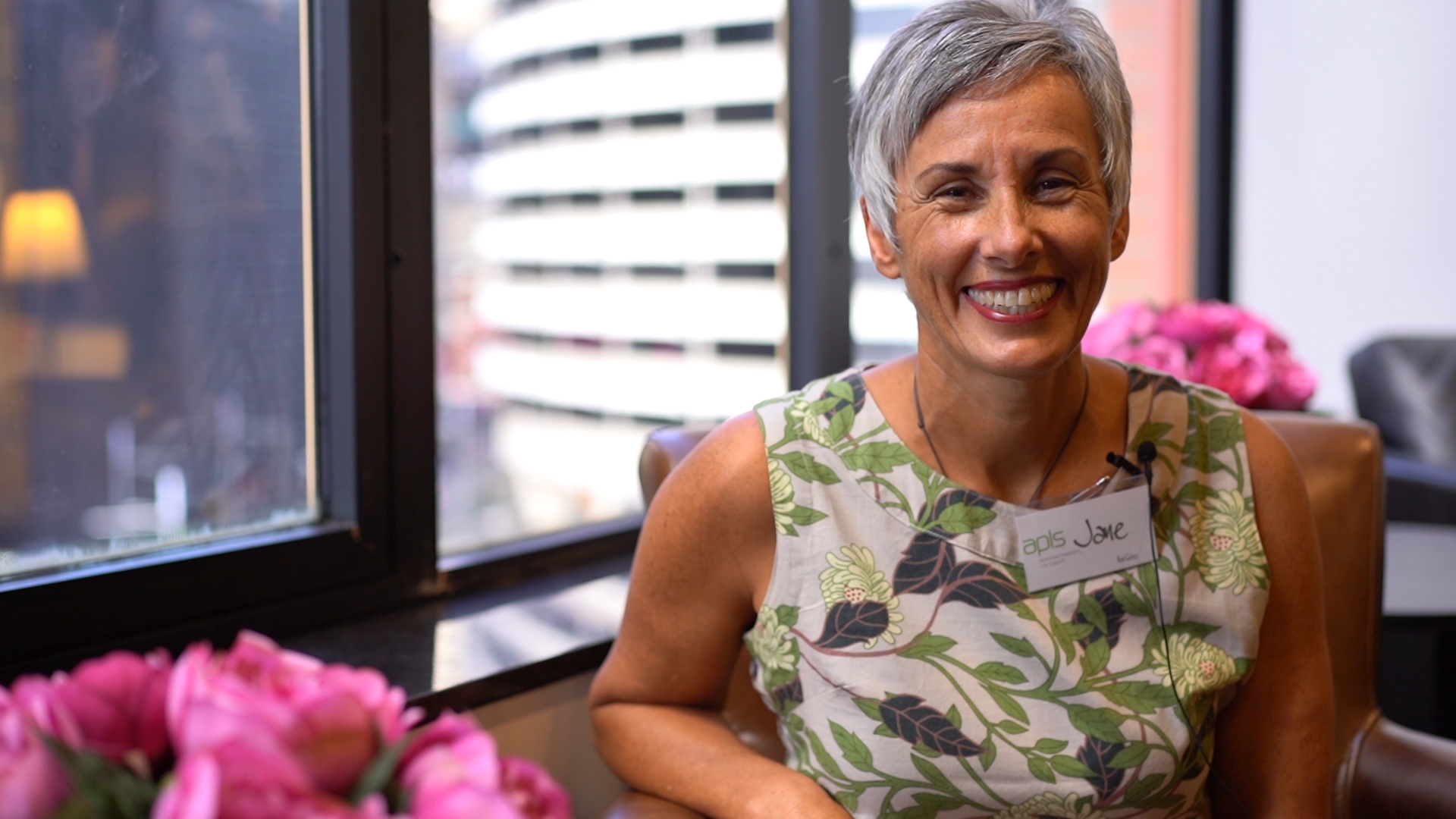
Introducing Instructor Development, a brand new e-learning course developed by the APLS education team.
This e-learning package is available free of charge to every APLS and PLS instructor, and you can access via learning.apls.org.au or My APLS.
One of 2021's biggest projects from our education team, Instructor Development is a skills refresher for all APLS instructors. It offers practical tips, key concepts and thought-provoking exercises to support you as a medical educator.
In the excerpt above, Linda, an APLS director talks about the culture of curiosity that makes APLS instructors so special.
Exploring the fundamentals of the structured approach to teaching as used on APLS courses, the e-learning package brings ideas from the GIC and ESDC courses for faculty to complete at their own pace.
Available modules currently include Scenario Teaching, and Debriefing using the Learning Conversation. We will shortly be adding modules on Discussion Groups, Skills Teaching and Skills Assessment, which will be available in the new year.
The package is particularly aimed at PLS provider instructors - APLS graduates who teach on PLS courses but haven't had chance to complete a full GIC - but there's something in there for everyone.
Together with the GIC course for new instructors, the ESDC course for experienced instructors and coaching available on many APLS courses, Instructor Development is a fantastic addition to our suite of instructor resources.
Try it out via APLS online learning and let us know your thoughts!
An APLS refresher course – and delivering it in two days – has been top of our wish list for years.
So, after 12 months of development and two pilots, we're delighted to add seven APLS 2 Day Refresher courses to next year's calendar.
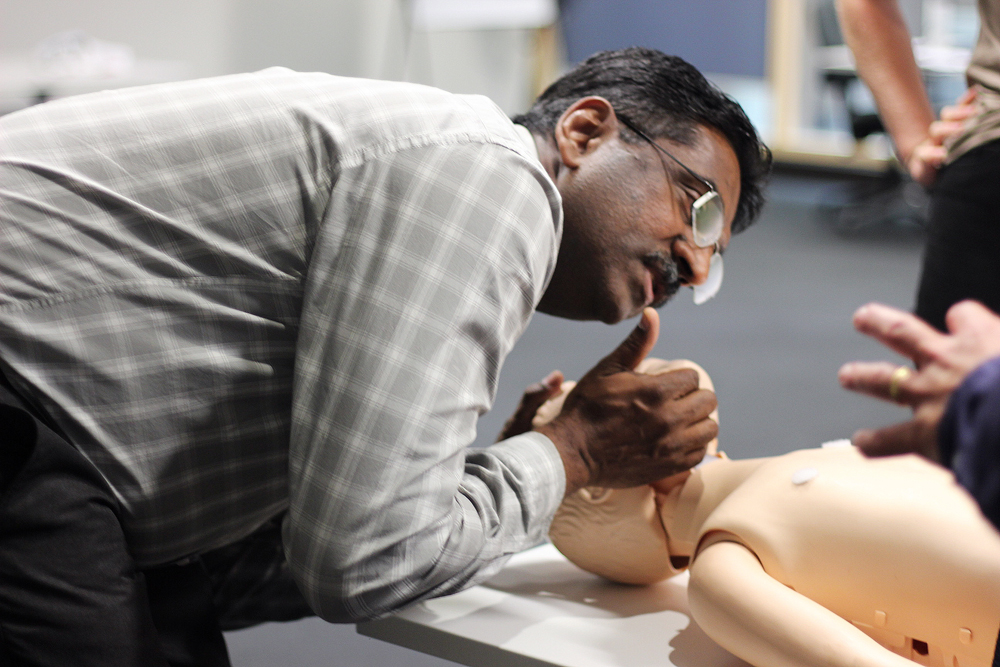
"The refresher course is aimed at learners who have already done an APLS provider course, who are looking for something a bit different," says APLS Clinical Officer Noel Roberts who, as a member of the Course Development Committee was involved with the development of the new course.
"Candidates told us they were looking for potentially more complex scenarios, something a bit more challenging and outside of their comfort zone, as well as working with a group of learners who'd also all done the course before, so starting at a comparative clinical level. And no doubt they were hopefully looking to get it done in two days! Being busy clinicians who are time poor, two days is very attractive."
The concept for a refresher course came from our Big Survey back in 2017, when both a two-day version of APLS and a refresher course came out as the most popular options across our membership for the development of a brand new course offering.
The enforced COVID-19 break gave our course development and education teams a chance to really consider what a refresher course would look like – a significant job.
"It's impossible to fit the full provider program into two days," says Noel. "The Course Development Committee started discussing it seriously in October 2020, with lots of debate on what to leave in or out, writing new scenarios, two days or three days, and what a potential format might look like."
A "really busy" few months followed with a pilot in May and another in September, with consultation from a wide range of faculty, past candidates, and pilot course candidates on how to make a two-day course work.
"We asked what people most valued from the refresher, and it seemed they valued the scenario teaching most highly," explains Noel. "Candidates wanted to re-accredit for ALS and BLS performance and review the airway skills teaching and safe emergency airway management. Intraosseous insertion and chest procedures were also valued, as uncommon procedures that learners wanted to refresh on. The discussion group topics have been incorporated into the scenarios, and consequently scenarios now last for 30 minutes.”
"It's more about reviewing and practising skills than teaching new skills for most of these learners. Day 1 starts with a plenary reviewing both the approach to the seriously ill child, and management of advanced life support, as well as skill stations on airways, BLS, ALS, defibrillation, airway management - and then we go straight into running scenarios. Because they're 30 minutes, they can get more complex as they develop and incorporate other areas of APLS, such as management of specific trauma/illness problems and post-resus care. Day 2 includes the chest, intraosseous and safe emergency airway management workshops which lead into the trauma and illness scenario teaching. Feedback has been really positive from the learners so far.”
What is the APLS 2 Day Refresher Course?
A fully accredited, two day skills and knowledge refresher for clinicians who have previously completed a full APLS course.
How can I register?
With just seven courses next year in the next stage of our rollout, registration will be by invitation only. We will contact eligible candidates directly via email in the new year with an invitation.
Am I eligible?
If you completed an APLS course between 2015 and 2017, and live in the state where a course is taking place, you are eligible for a 2022 Refresher Course. We already have your details, and you will be contacted via email when registration opens for these courses in the new year.
Can I sign up for notifications?
You can sign up here, and if you meet the eligibility criteria you will be notified as soon as booking is available for a refresher course near you.
Over time, the 2 Day Refresher course will be available for general registration to any candidate who has completed an APLS course in the last 10 years. For the moment it is by invitation only as we continue to roll out the course. For the seven courses slated for 2022, we will invite you directly via email when you're eligible to register. APLS accreditation lasts five years, so we will invite candidates whose accreditation is within a year of expiry, with the emphasis on local candidates due to COVID-19 considerations.
For instructors, at this early stage faculty have been selected who usually have over five years' experience teaching on provider courses and some further education experience - including GIC, ESDC or other significant simulation teaching experience. You can nominate as usual via Choose your Courses.
The 2 Day Refresher packs a lot into a short space of time, but as ever, it's our learners that make the course worthwhile.
"People really enjoyed the experience and I think enjoyed the peer-facilitated culture around it," says Noel. "It's been a very collegial, learner centred approach - which is a trademark of the three-day course, but for refreshers, because you've got experienced participants, they contribute a lot to discussions and often run quite a lot of the feedback themselves, which is great."
"Especially for instructors, because we can watch and learn as well!"
With COVID impacting the support of our international APLS colleagues, APLS Educators Jane Cichero and Jane Stanford decided to think outside the box.
In particular, how APLS Australia could potentially support the Sri Lankan APLS faculty while some Australian faculty were in Western Australia for the GIC & Refresher courses.
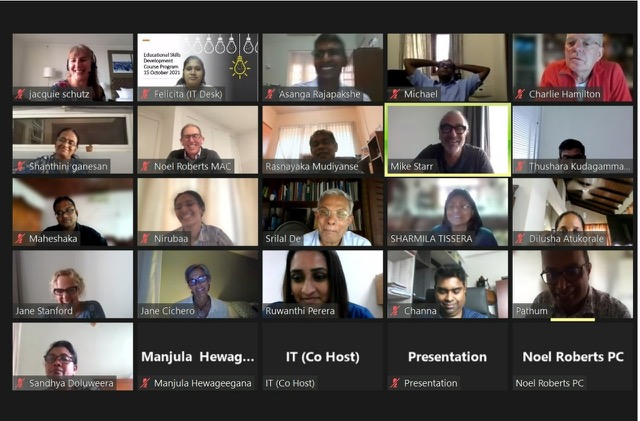
So, at the beginning of September initial discussions with Srilal, Sharmila, Bhiruntha (Sri Lanka) & Swati (IT support in India) and Mike Sheppard (NZ) as the link, took place to see if there was anything we could do as a collaborative with the Sri Lankan faculty. With Jane Stanford “heading bush” Jane Cichero took on the lead for planning.
Planning
Within a week of our first meeting (idea inception!) we had drafted a program – The Online Educational Skills Development Course (ESDC) – Sri Lanka. Over the following weeks we held almost weekly meetings with Sri Lanka & our IT support in India to deliver the course on the 15th, 16th & 17th October. The course was a half day course (5 1/2hrs), repeated each day with a faculty of 8 (pairs of 1 x Sri Lankan + 1 x Australian) and 16 participants (4 groups of 4). Start times were 0830 hrs Sri Lankan time, 1045 hrs Perth time & 1345 hrs EST (Melbourne & Sydney).
Program
The participants were given access to the recently released Instructor Development e-learning prior to the course of which the majority had completed. The principal format of the day was to do some initial work together as a whole group, view a video & then move to “breakout rooms” to reflect and practice skills covered in the previous video. The challenges for faculty in Sri Lanka that Srilal, Sharmila & Bhirutha had identified were debriefing, scenario teaching and discussion groups, so the program focussed on these areas. As per usual format in GIC’s & ESDC’s, peer support, feedback & development were role modelled and peer to peer feedback promoted within the Sri Lankan faculty. See attached Appendix Program. The course was supported by IT expert Felicita from India who works for Laerdal and Pedistar. Pedistar already have a strong relationship with the Sri Lanka simulation community of education.
Evaluations
In total we had approximately 44 participants over the 3 days. We conducted pre-course and post-course surveys with 30 participants completing the surveys. Overall, the feedback was extremely positive, and many felt they had improved confidence & skills in the three key areas.
While many stated they would love to have face to face (dinners, music & dancing!) many also found the benefits of online meant it was stress free, easy to be able to attend and a great way to connect & refresh their skills again despite distance and lockdown.
Adaptability & conclusion
The format of this Online ESDC has demonstrated a useful alternative to face-to-face faculty development. Professor Rasnayaka M Mudiyanse participated on the first day and then joined as faculty for days 2 & 3. Mudi has already proposed some follow up strategies for embedding learnings within the Sri Lankan faculty, a follow up short course and a long-term evaluation & publication of results to share our learnings with fellow educators around the world.
The APLS Educator team of Jane S, Noel & Jane C will revise the program following the feedback and look at opportunities for adapting to others in the APLS community, both within Australia and internationally. We would like to thank the Sri Lankan faculty for their enthusiasm and willingness to try something new & the Australian faculty for their time and commitment. Thanks also to Jacquie Schutz, Mike Starr, Jim Flynn and Charlie Hamilton for giving this project their time, skills and care.
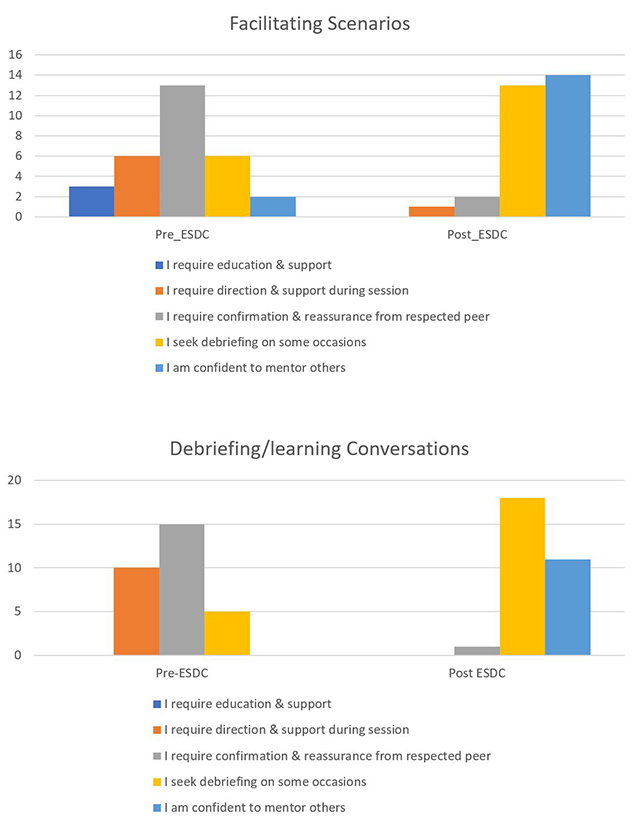
Despite the challenges of 2021, the APLS IDC has continued to support projects that will contribute to APLS instructor, director, and coach development.
The APLS course continues to be highly regarded by candidates, largely driven by the quality and enthusiasm of our volunteer instructors.
The IDC is committed to aiding APLS to adapt to the changing needs of our instructor base and our candidates, particularly in this time of COVID-19.
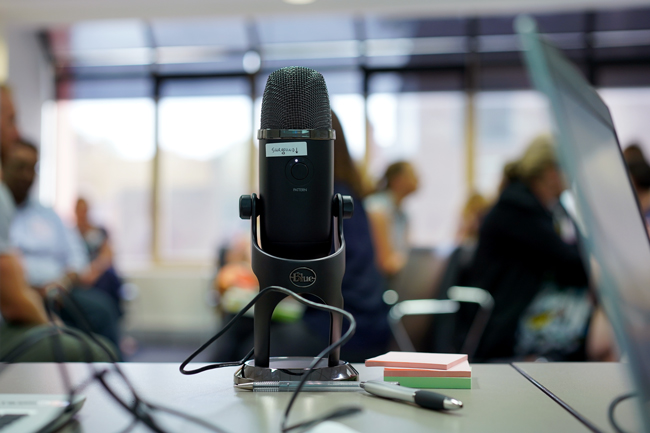
The current priorities and actions of the IDC include:
Thanks to all committee members, instructors and staff who have contributed to the Instructor Development Committee’s work in 2021.
The PLS committee has continued, albeit with a transiently decreased frequency of meetings over the past two years.
Over the last two years, the focus of the committee has been on how best to support PLS instructor providers. These are faculty members who are not APLS instructors but make a valuable contribution to PLS teaching.
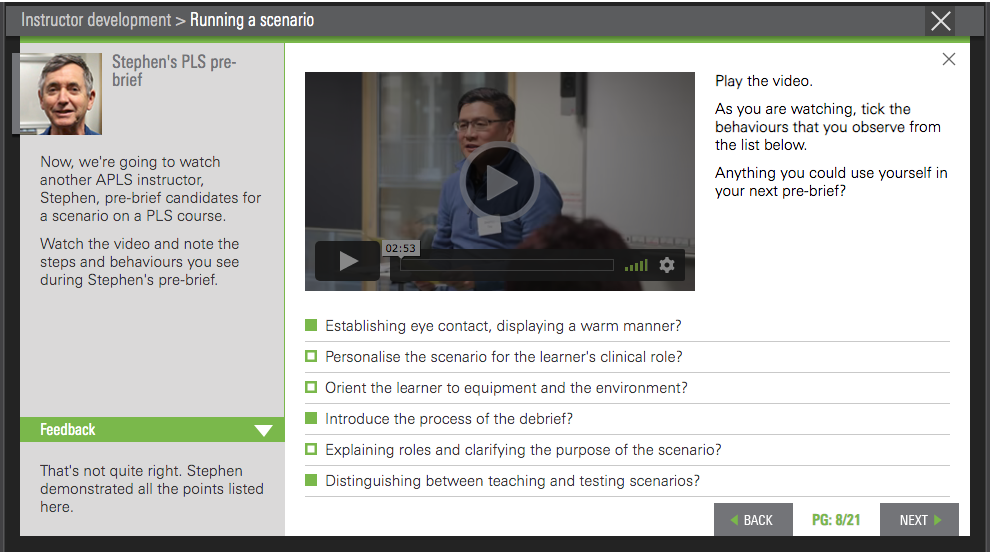
Scripts for modules on skills teaching, skills assessment, scenario teaching with a learning conversation, and discussion groups were developed and refined. In August 2019, four committee members spent valuable time at APLS HQ with Jane Stanford and Noel Roberts, being filmed by David Watton for this PLS Instructor-focused e-learning package.
The package has now been released to all instructors under the title 'Instructor Development', and you can read more about it here.
If you are a PLS provider instructor and would like access to the package, let us know here.
The overarching aim is to support all existing and future PLS instructors to undertake the e-learning, then be mentored on two PLS courses as instructor candidates (ICs) by a full APLS instructor, the same way as for APLS ICs. It is recognised that faculty numbers are fewer on PLS compared to APLS courses, and the committee will look at ways to best support the ICs with this in mind.
The number of PLS courses decreased from 30 in 2019 to 23 in 2020, however there have been 41 already in 2021, with 20 individual coordinators. On these 41 courses, 585 learners were facilitated by 234 faculty (50% each APLS instructors and PLS instructor providers).
The committee has been sorry to say farewell to Margie Lane and Jon Darvill. At least we can still hear and see them in the e-learning package! We wish the best for their post PLS goals and we thank them for their great support and work for APLS and PLS.
Over this same period, we have been delighted to welcome two new members of the committee, Ashlee Farrell at APLS, without whom we would not have the above data, and Stephen Bradley from APLS New Zealand, and we look forward to much productivity in the coming year.
If you are involved in PLS and would be interested in contributing to the PLS Committee in the future, let us know here.
Sadly, no conference again this year as we lost PAC 2021 to COVID-19 restrictions. We'll be back bigger and brighter with PAC 2022 next year for our 25th anniversary.
Looking to book an APLS course? We have recently updated our cancellation policy to reflect ongoing COVID-19 considerations. You can also view our COVID-19 and APLS courses information page here.
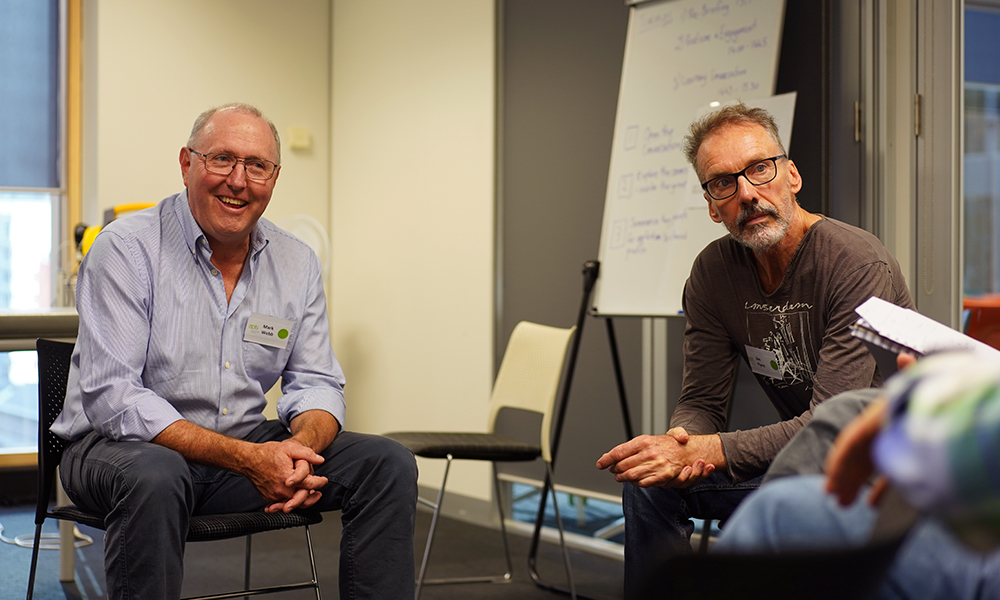
All at APLS would like to send our sincere thanks to Jon Darvill, a longtime instructor and strong advocate for PLS on his recent retirement from all things APLS. Jon has instructed and coordinated extensively both across Australia and internationally, served as a valuable member of the PLS Committee, and volunteered his time to present some of our online modules, so we're delighted that future faculty members will still have the chance to share his wisdom, albeit virtually. All the best for the future Jon.
Returning to APLS after some time away? Click 'Update my Details' in My APLS to make sure we've still got your correct job title, place of work and contact info.
As mentioned in the earlier article about Sri Lanka, our Generic Instructor Courses (GIC) have looked a little different over the past year, running with a hub-based model with faculties and candidates in different states, connected remotely. Our most recent GIC had faculty members and candidates in Melbourne, Sydney and Adelaide experiencing the same course, breaking out for small group sessions in their own location and joining together for larger group plenaries. This is together with an expanded suite of pre-course resources. Thanks to all involved for their patience and enthusiasm as we've developed our hub-based model, it's been great to keep the GIC process going despite the restrictions of COVID-19.
A reminder of our employee assistance program, EAP Assist: here in the APLS office we talk about our community being a family, and we do mean it. EAP Assist is available, for free and with full confidentiality, to any instructor who might feel they need some extra support. You can contact EAP Assist any time via their website or on 0407 086 000, just use the reference 'APLS'.
Course feedback: candidate feedback forms after a course are now submitted via QR code rather than the old paper versions. We also just trialled a digital version of candidate assessment forms, which we hope to be able to roll out on more courses next year.
And finally... Best wishes of the season from all at APLS HQ to our fantastic community of clinicians. The APLS Head Office will be closed from Fri 17th Dec until Mon 10th Jan for the Christmas break, and emails and calls will not be monitored during that period. Have a safe and happy Christmas and a wonderful new year. See you in 2022!